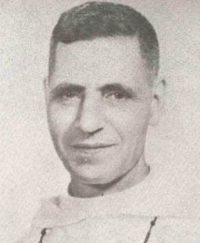I visited Fr. Daniel Castrillo, an Augustinian and a townmate of mine, who was Parish Priest of Porac, Pampanga, and Señor Suárez, a Spanish national from the same town, who had two sons in Letran. They came to Manila several days ago, and their tragic experiences could fill several volumes.
On January 20, the invading forces came to the neighborhood of Porac in their advance march from Bulacan, to surprise the forces which were defending Fort Stotsenberg and southern Tarlac. However, the USAFFE had abandoned the town. The inhabitants of the town had likewise fled. Fr. Daniel and his assistant sought shelter with a friend’s family in a nearby valley.
Then an advance Japanese platoon came, scanned the town, and left immediately, undoubtedly to report that the town was clear of enemies. Shortly afterwards, a big contingent arrived, installing themselves in abandoned houses for the night.
It was a trap. The USAFFE had retreated to the hills surrounding and overlooking the town, and when the Japanese were asleep, they rained artillery on the occupied houses razing them to the ground. More yellow faces came, and the battle ensued without letup for five days and five nights. The Japanese finally succeeded in flanking the USAFFE, driving them to the mountains of Zambales and Bataan.
Fr. Daniel and his fellow refugees in the valley saw and heard the bullets whizzing over them. After two days, when the firing had somehow subsided, Fr. Daniel went up to the valley to see if the fighting had ended. Hardly had he raised his head when he was fired at. He had time to drop down but the machine gun continued firing and he could feel the bullets whistling over him. When he believed that the danger was over, he started to crawl. The machine gun opened fire again. The good Father was hoping that night would come fast so he could free himself from that nest. He could not tell whether it was American or Japanese but that was immaterial. He descended the valley under the cover of darkness. His companions, however, had left, having given him up for dead. He wandered about for a while until he lost his bearings. Finally he came across several men whom he asked to lead him to the hacienda of Señor Suárez. Some of the men, especially the communists, were equipped with arms which were left behind by the fleeing USAFFE. They started accusing him of being a fifth columnist and threatened to kill him. Because he was raising the helm of his habit which was hindering his steps and gathering dust, they accused him of signalling to the Japanese. They therefore removed his habit and gave him a shirt with colored stripes. The other communists threatened to kill him, as colored stripes were signals to enemy planes.
Meanwhile, Señor Suárez, who was at his home, could hear the battle from five kilometers away. When the fighting ended, he refused to join the forces and the people in fleeing to the mountains.
Before he knew it, armed socialists were plundering his household. These people attacked, burned and killed. After providing his wife and his son with rifles, Señor Suárez barricaded his house with mattresses, determined to fight it out to the end. For twenty-five days they stood guard. One of them saw a man approaching, waving a piece of cloth. He looked Spanish, with worn out shoes, bloody legs and the body so consumed that they did not recognize him until he came in. He was Father Daniel who, after crossing hills and mountains, arrived more dead than alive. They made inquiries and sent out search parties for Fr. Pablo, but after several days of searching, they gave him up for dead, a victim of murder and robbery at the hands of the bandits.
At last, thanks to the kind gesture of the Spanish consul, Fr. De Celis was able to fetch him and bring him to Manila in a social welfare truck. He recounted that almost all the towns of Pampanga had been destroyed. Not one house remained standing in Angeles, Porac, Guagua, Lubao, Apalit and other towns which had a total population of about 20,000. More than half of San Fernando was razed to the ground. Some houses were destroyed by the troops, others by marauders. The whole populace, rich and poor alike, fled to the mountains, leaving behind their crops which later withered and died. Their greatest danger was from the bandits who possessed plenty of arms and ammunition abandoned by the Army.
